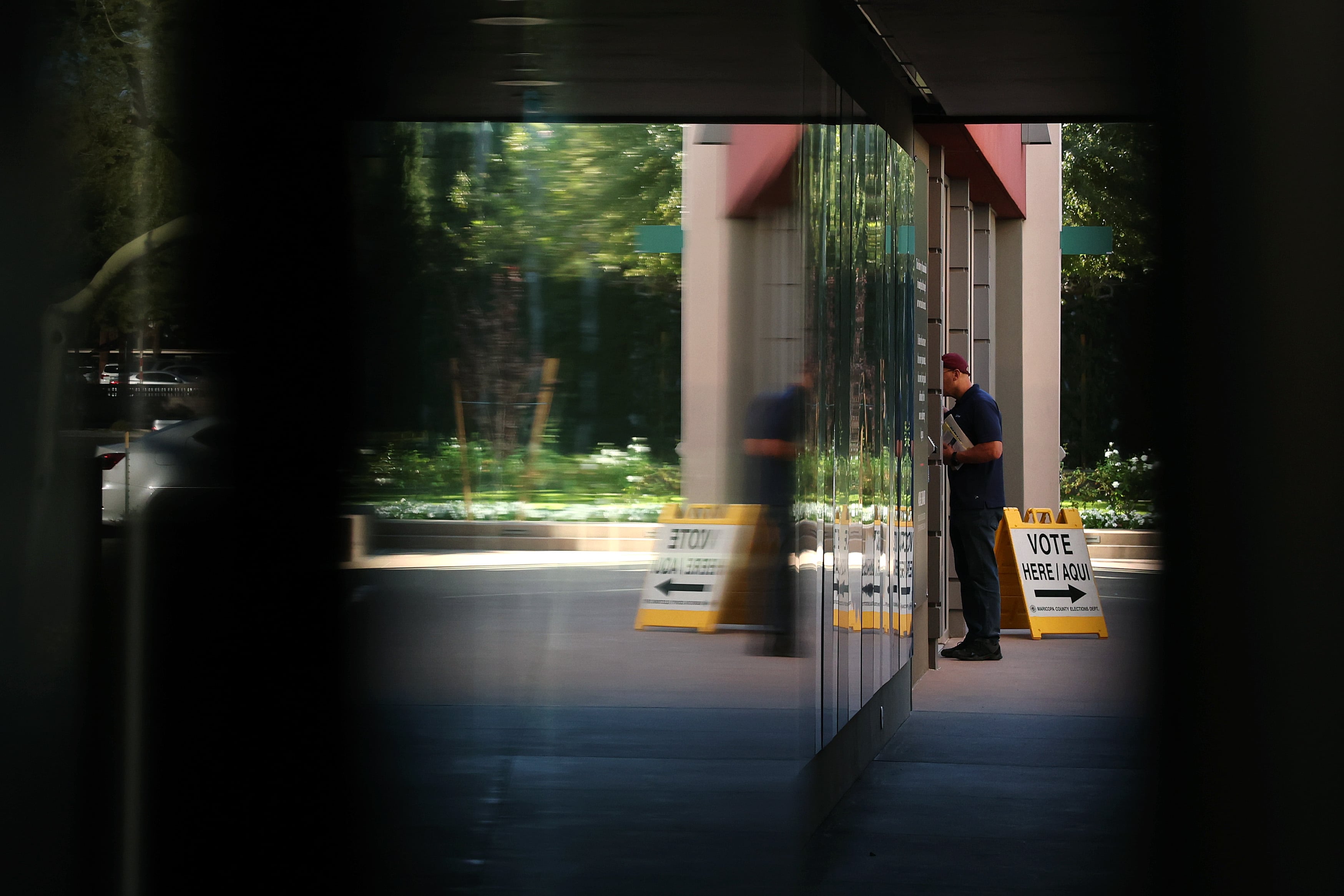Votebeat is a nonprofit news organization reporting on voting access and election administration across the U.S. Sign up for Votebeat Arizona’s free newsletter here.
Maricopa County incorrectly flagged around 2,000 longtime registered voters as needing to provide proof of citizenship in order to vote in Tuesday’s election, county officials confirmed Sunday.
That number is in addition to nearly 900 Pinal County voters who were incorrectly told the same thing, which Votebeat first reported Saturday.
The voters who were incorrectly asked for the information will no longer need to provide proof of citizenship before 7 p.m. Tuesday in order to cast ballots in this election, as some number of them were initially told, according to officials in both counties.
If voters had already attempted to vote an early ballot and had the ballot put on hold or voided, those ballots will now be counted. Voters who had not yet cast their ballots should not have an issue when they go to vote.
That means these voters will have the chance to help determine the result of elections in this divided swing state, where close margins are expected from the presidential race to statewide ballot propositions.
Maricopa County had moved the voters to “not registered status,” which meant that they were no longer on the active voter rolls, according to couty Recorder’s Office spokesperson Taylor Kinnerup. If any of those voters cast an early ballot, it appears that the county initially voided their ballots. Officials have since worked to “restore any ballots that were voided ... and those votes have since moved forward,” Kinnerup said.
Officials restored the voters’ status on Oct. 21, Kinnerup said. She did not respond to a question about why the office changed course.
After learning of the issue in Pinal County, Votebeat reached out to the state’s largest counties, including Maricopa, to check whether incorrect information had been conveyed to voters there as well.
Besides Maricopa and Pinal counties, it’s unclear whether other counties incorrectly flagged voters’ registrations, and if any voters will have trouble voting Tuesday because of it. Pima, Yavapai, and Coconino, the three other counties that have so far responded to inquiries, all said they did not incorrectly flag voters in their systems.
The problem stems from two recent court decisions related to proof of citizenship requirements in the state.
The voters who were affected had tried to update their voter registration just before the Oct. 7 voter registration deadline. The county had flagged these registrations because of changes the county made to the way it was processing voter registration forms in response to two separate court decisions, both regarding requirements in state law for voter proof of citizenship.
Arizona has a unique law that requires proof of citizenship to vote in state and local elections. Federal law requires applicants only to attest to their citizenship to vote. If an Arizona applicant doesn’t provide proof of citizenship, they are placed on a “federal only” voter list and are restricted to voting in federal contests like presidential and congressional races.
In the first recent court decision related to the state’s laws on proof of citizenship, the U.S. Supreme Court ruled Aug. 22 that county recorders should completely reject voter registration forms from voters if they register using a state form and don’t provide proof of citizenship. Previously, these voters would have been registered as federal-only voters. The ruling is in effect until the courts can fully consider the case.
The second court decision came after the state realized that a problem with the Motor Vehicle Division database had allowed about 218,000 longtime driver’s license holders to become full ballot voters, even though they had not provided proof of citizenship. The Arizona Supreme Court ruled Sept. 20 that these voters would not have to provide citizenship proof until after the November election.
Still, starting sometime soon after the state discovered the MVD problem, the state reprogrammed its system to flag those 218,000 voters if they tried to make a change to their voter record, to notify the counties that they hadn’t yet provided proof of citizenship. The Secretary of State’s Office provided guidance in early October to county recorders telling them that, even though the system was flagging these voters, they should continue to allow them to vote a full ballot until after November.
Instead, from the time the state’s system was reprogrammed to the voter registration deadline on Oct. 7, if a voter in Maricopa or Pinal county on this list of 218,000 tried to update their voter record using a state form, the counties flagged their registration until they provided proof of citizenship.
The counties both mailed at least some of these residents a letter to tell them they needed to provide proof of citizenship before they voted.
“After further consideration, the decision was made to fully restore those voters from the not registered status, only if they were previously an existing, registered voter,” Kinnerup said on Sunday. “This means any Maricopa County voter impacted by the previously discovered MVD data oversight has since been restored back to their original status of either full or fed-only ballot for this upcoming election.”
Jen Fifield is a reporter for Votebeat based in Arizona. Contact Jen at jfifield@votebeat.org.



